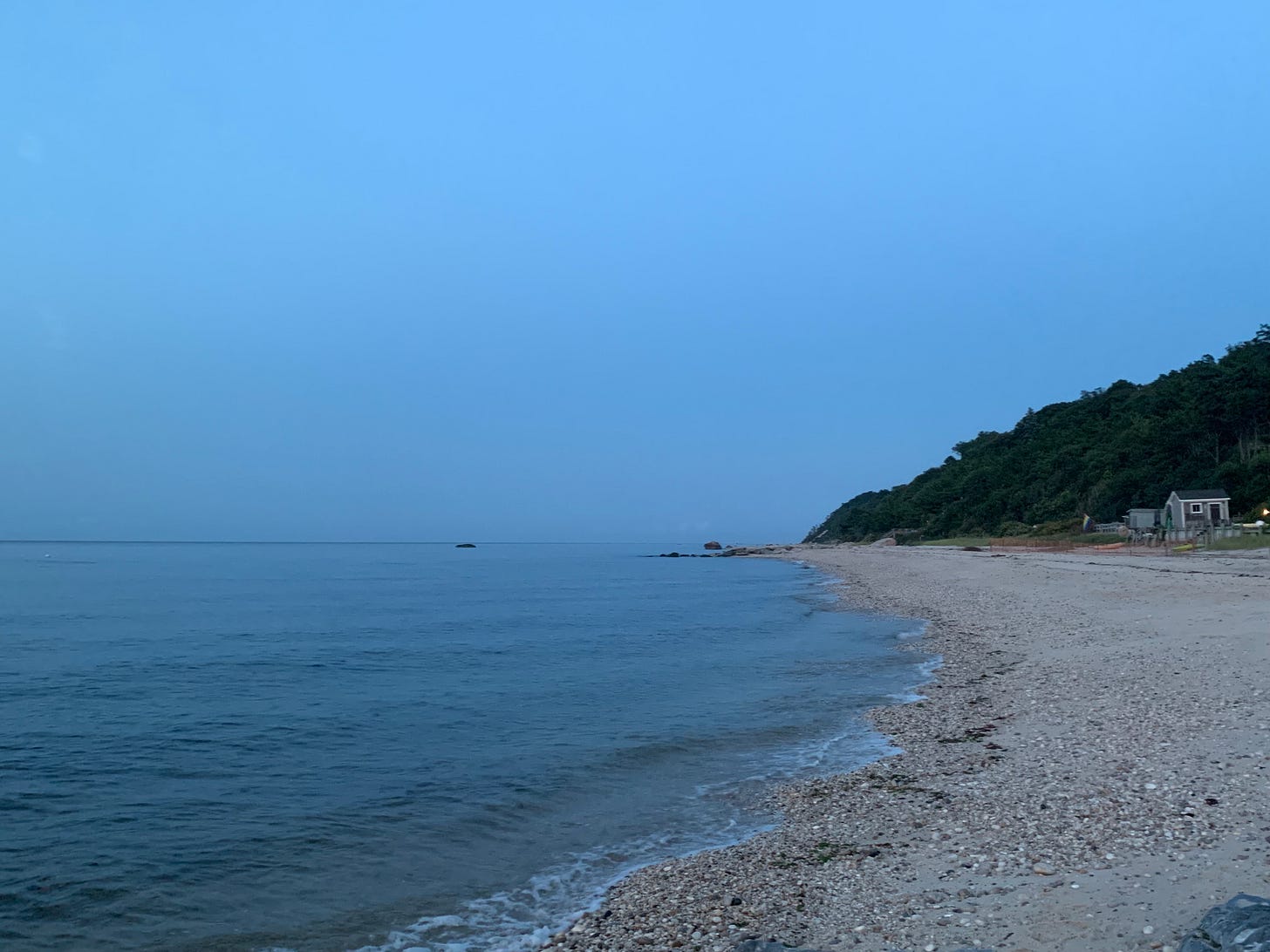Over the weekend, for the first time all summer, John and I went to the beach.
A few beaches, actually. The first (pictured above) was a rocky beach on the north shore of Long Island—an idyllic scene framed by trees and overlooking the tame Long Island Sound. The water is inviting and still. Although if you squint you can see Connecticut in the distance, the Sound is huge enough that it seems to go on forever.
On Sunday we went to Long Beach. A south shore beach, this one has been marked much more noticeably by human influence. Instead of trees, the beach is framed by unsightly apartment buildings. Ships litter the horizon; tire-tracks leave impressions in the sand. Although it was much too cold and cloudy when we went, I’ve previously seen airplanes flying advertisements in the sky.
An interesting thing I’ve learned while living in New York is that the most beautiful places are often the ones that get ‘ruined’ the most thoroughly. It’s what happened to Long Island—ironically, it was turned into New York City’s strip mall precisely because of its natural beauty. Wealthy vacationers flocked there, lavish estates dotted the coast.
Of course, once developers smell a profit and demand continues to grow, the very thing that attracts people to a place gets plowed and paved to make way for new settlers. If they could, they’d fill the ocean itself with concrete and open a shopping center with a Starbucks on one edge and a tiki bar on the other.
However, certain things are too large to be commercialized. You can really understand how big the ocean is after recently laying eyes on the Sound. As you stand with your feet in the water feeling the waves crash onto your legs and onto the sand, you remember that waves are just the product of constantly-moving water reaching the edge of its container. While the Sound brushes outward gently at the edges, the sheer mass of the Atlantic Ocean causes it to thrash violently, so much so that if you’re not careful, it can pull you under, swallow you completely.
Then you might remember that the Atlantic is only the second-largest ocean. The Pacific is bigger than all continents of the Earth combined. It’s humbling. No matter how significant we think we are, we’ll never be as populous as whatever lies beyond those shores.
Humans like to get in their own heads. We like to deliberate the meaning of the word ‘beauty.’ Some of us are even so arrogant as to think that we create it—that beauty is socially-constructed, and somehow relative.
Nothing disproves human egocentrism quite like the beach. Although the human race has capitalized on it the best it can, lining it with boardwalks and shops and hiring sentries at designated entry-points to collect a state-mandated fee in exchange for admittance onto one of nature’s greatest gifts, the seagulls bypass the cost of admission, and there’s nothing we can do to stop them. They don’t need sand-chairs or towels or sunscreen or umbrellas. They don’t pack coolers with drinks and soggy ham and cheese sandwiches. They pluck their meal right out of the ocean, and if the opportunity presents itself, they’ll even steal yours.
However, despite our insistence that life is just about eating and reproducing and just generally surviving, the seagulls do not disappear once their basic needs are met. Instead, they sit on the sand facing the ocean. They do every day what we’re lucky if we can carve out the time to do a few times a summer: relax and watch the waves.

How can you deny the universality of beauty when looking at a scene like this? Birds and humans, the ocean captivates all of us alike. We’re all dwarfed by its magnitude, we all position ourselves toward it like flowers facing the sun.
The sun, the water, the earth, the air—nothing defies us and compels us quite so completely. Perhaps the ancients were right to call them gods.
The waves will go on thrashing long after we’ve gone home.
Eventually, when we’re all gone, they’ll swallow us.
Thank you for reading. If you enjoy these posts and would like to support my work, consider becoming a free or paid subscriber.
You can also buy me a coffee. Or a trip to the beach.



Great piece, Melissa!
"He has made everything beautiful in its time. Also, He has put eternity in their hearts, except that no one can find out the work that God does from beginning to end.” (Ecclesiastes 3:11)
The commonality of the rush in human hearts at the edge of an ocean, the foot of a mountain, or the night-time bottom of the vast bowl of stars forced theologians to come up with a name for the sense of awe. The name “General Revelation” may sound mundane but it still stirs the soul.